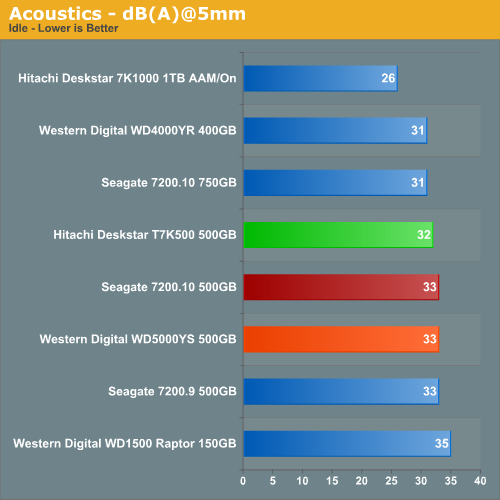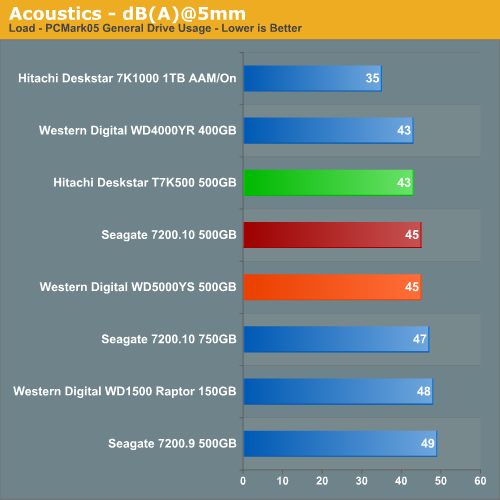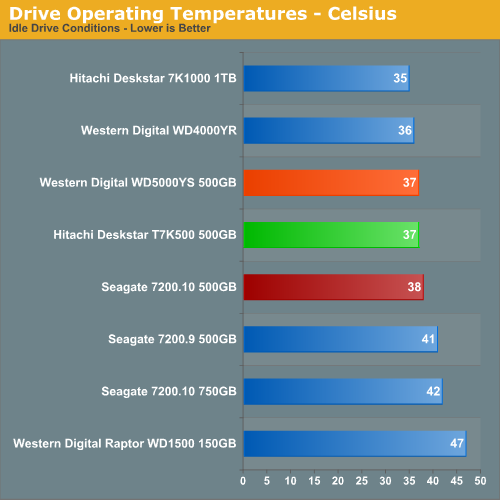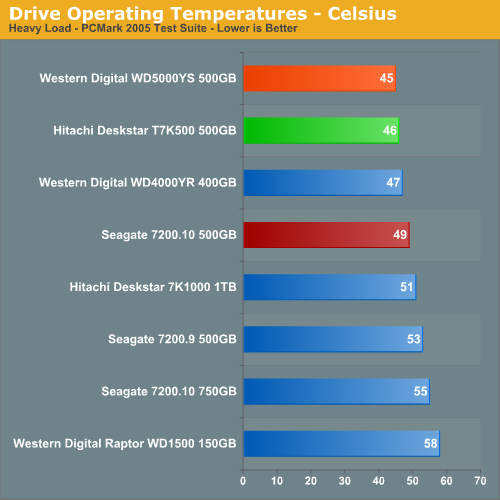Seagate 7200.10 500GB: Hitting the Sweet Spot
by Gary Key and Dave Robinet on July 6, 2007 11:00 PM EST- Posted in
- Storage
Acoustics
Our acoustic test utilizes our standard test bed components but we implement Intel's power saving technology and turn off the case fans to isolate as much case noise as possible during testing. Our Corsair power supply is nearly silent in these tests and our MSI 8800GTX video card is water cooled by an external unit to provide a further decrease in our case's ambient noise levels. Our drives are attached to the drive cage with rubber bushings to assist in isolating the noise of the drive and avoid the resulting harmonic changes due to the case design.
Our acoustic tests are designed to measure the decibel levels while the system is at idle and also under load while running the General Hard Disk Drive Usage benchmark within PCMark 2005. We found through trial and error that this particular benchmark produces controlled readings across a wide range of applications within the benchmark. This particular benchmark utilizes 60% reads and 40% writes within the trace playback file.
The measurements are taken at a distance of 5mm from the rear and front of the drive being tested in order to minimize surrounding environmental noise. We have noticed that unless we run a completely silent system in a quiet room that measurements taken from 1m are generally not meaningful due to ambient noise levels. There are exceptions like the Raptor series of drives but overall most modern desktop drives are quieter now than the other components in the system while under load.
The reported measurements are based on an A-weighted decibel score that measures frequencies similar to the way the human ear responds to sound. We take a total of three measurements for each test. We then subtract the high and low scores and arrive at our findings by reporting the remaining score.


Our Seagate 7200.10 is fairly quiet when compared to the other 500GB drives at idle. We basically did not have any issues with the drive's noise levels at idle or during light operations. However, there was a significant audible noise during heavy read seeks and the Nero Recode tests. This particular tone was noticeable with the case closed and up to two feet away. Our base dB(A) level in the room at the time of testing was 25 dB(A).
Thermals
Our thermal tests utilize sensor readings via the S.M.A.R.T. (Self-Monitoring, Analysis and Reporting Technology) capability of the drives and are reported by utilizing the Active SMART 2.42 utility. We also utilize thermal sensors and infrared measurement devices to verify our utility results. We test our drives in an enclosed case environment without the fans operational to simulate temperatures that could conceivably be reached in a near silent SFF or HTPC case design. We typically find the reported numbers drop anywhere from 18% to 25% on average with the case fans operational. Our base temperature level in the room at the time of testing was 25C.


There are no real surprises at idle as the 500GB drives all currently use the same number of heads and platters. However, under load conditions we see the Seagate PMR design running up to 4C hotter than the other two 500GB drives. This has been a pattern with the Seagate PMR drives and something we will take note of in testing Western Digital's new AAKS PMR based drives. We saw the load temperatures drop from 49C to 43C under load conditions with the front fans operational. We highly recommend a fan be installed near the drive during normal operation.
Our acoustic test utilizes our standard test bed components but we implement Intel's power saving technology and turn off the case fans to isolate as much case noise as possible during testing. Our Corsair power supply is nearly silent in these tests and our MSI 8800GTX video card is water cooled by an external unit to provide a further decrease in our case's ambient noise levels. Our drives are attached to the drive cage with rubber bushings to assist in isolating the noise of the drive and avoid the resulting harmonic changes due to the case design.
Our acoustic tests are designed to measure the decibel levels while the system is at idle and also under load while running the General Hard Disk Drive Usage benchmark within PCMark 2005. We found through trial and error that this particular benchmark produces controlled readings across a wide range of applications within the benchmark. This particular benchmark utilizes 60% reads and 40% writes within the trace playback file.
The measurements are taken at a distance of 5mm from the rear and front of the drive being tested in order to minimize surrounding environmental noise. We have noticed that unless we run a completely silent system in a quiet room that measurements taken from 1m are generally not meaningful due to ambient noise levels. There are exceptions like the Raptor series of drives but overall most modern desktop drives are quieter now than the other components in the system while under load.
The reported measurements are based on an A-weighted decibel score that measures frequencies similar to the way the human ear responds to sound. We take a total of three measurements for each test. We then subtract the high and low scores and arrive at our findings by reporting the remaining score.


Our Seagate 7200.10 is fairly quiet when compared to the other 500GB drives at idle. We basically did not have any issues with the drive's noise levels at idle or during light operations. However, there was a significant audible noise during heavy read seeks and the Nero Recode tests. This particular tone was noticeable with the case closed and up to two feet away. Our base dB(A) level in the room at the time of testing was 25 dB(A).
Thermals
Our thermal tests utilize sensor readings via the S.M.A.R.T. (Self-Monitoring, Analysis and Reporting Technology) capability of the drives and are reported by utilizing the Active SMART 2.42 utility. We also utilize thermal sensors and infrared measurement devices to verify our utility results. We test our drives in an enclosed case environment without the fans operational to simulate temperatures that could conceivably be reached in a near silent SFF or HTPC case design. We typically find the reported numbers drop anywhere from 18% to 25% on average with the case fans operational. Our base temperature level in the room at the time of testing was 25C.


There are no real surprises at idle as the 500GB drives all currently use the same number of heads and platters. However, under load conditions we see the Seagate PMR design running up to 4C hotter than the other two 500GB drives. This has been a pattern with the Seagate PMR drives and something we will take note of in testing Western Digital's new AAKS PMR based drives. We saw the load temperatures drop from 49C to 43C under load conditions with the front fans operational. We highly recommend a fan be installed near the drive during normal operation.










19 Comments
View All Comments
TA152H - Sunday, July 8, 2007 - link
That's absurd, for a hard drive company to make consistently lousy drives would kill it. There is reputation, and reputation matters a hell of lot. Are you too young to remember the nickname "Crashtor" for Maxtor drives? They shrunk big time when their drives sucked. So, no, they can't afford to make sucky drives that break all the time, but even within the context of a warranty, why do you suppose Western Digital and Hitachi don't do it if it's so inexpensive? Hmmmmm, maybe because they can't?Seagate has never had the notoriety for failures that IBM or Western Digital has. IBM's were of course more publicized, but even Western Digital's were fairly well known. Since people who are buying drives for servers and such are generally much smarter than the average person, and have good memories (scars?) when hardware fails, there is still some residual antipathy for IBM/Hitachi hard disks, and Western Digital. I haven't heard anything bad about Samsung, but I bought three of them and they all sucked. One was DOA, the other stopped working after a year, and the other had such an annoying whine to it, I eventually pulled it and used it as a projectile against encroaching squirrels. If other people have these experiences with Samsung, and people do tell other people they know, they may also have a less than stellar reputation, despite not being as publicized as IBM or Western Digital. Seagate, despite being the best known hard disk maker since the creation of the IBM PC XT, has managed to gain an excellent reputation for their drives. My only fear is that since they bought "Crashtor", it might take a few years to get back on track after absorbing that miserable company, so I've been avoiding them for a while. To this date, I have never had a Seagate hard drive fail, despite using them almost exclusively.
Anyone know what happened to Quantum? Boy did they suck. They whined worse than a kid at a carnival that didn't have enough money to buy cotton candy. What awful drives. Probably another company ate them.
ielmox - Tuesday, July 24, 2007 - link
Late 2001 - commissioned a system with the blisteringly fast IBM Deskstar. These drives smoked the competition and I was impressed with IBM engineering. Six months later, my system exploded and I became acquainted with the nickname "Deathstar".2002 - the contractor replaced the Deathstars with Crashtors. Failure less than 2 months later.
2002 - exasperated contractor installed Seagates, telling me that if these failed as well then my body must be emitting some sort of destructive magnetic field. The Seagates are still going strong today, and my PC is on for weeks at a time and under constant BitTorrent activity.
I like the performance indicated by recent AT and other articles for Samsung and Hitachi drives, but I respect the Seagate brand for its reliability and warranty. I'm really looking forward to seeing reviews of the Barracuda 7200.11, assuming of course that it ever makes the leap from press release concept to actual market product.
JakeBlade - Saturday, July 7, 2007 - link
Conveniently didn't include the latest 750GB Western Digital SE which blows away even the 1TB Hitachi.Also, I disagree with the weak brown nose attempt at the end by saying this turd 7200.10 drive "would still be a very solid choice for a gaming machine." Ummm, any gaming machine I build would have the 160GB WD or the Raptor. Then if you want mass storage for multimedia or binaries you get a Samsung T166 which is dead silent, has huge transfer rates, and is low priced.
DerekWilson - Saturday, July 7, 2007 - link
You really have to keep in mind that in a well designed game running on a system with a good amount of RAM, HD speed really won't impact gameplay. Yeah, install patching and load times will be affected, but generally gameplay is not a factor.We've seen it in real world benchmarks time and time again. If a game developer wants to make a playable game, there's just no way they can allow disk speed to become a performance factor.
The recent exception to this is S.T.A.L.K.E.R., which can hit the disk pretty hard when caching large areas of the map. Honestly, this was a poor design decision on the part of the developer. But you can actually adjust the behavior of the game here and get better performance with less caching. Tweakguides.com has a good description of how to do this.
Either way, a gamer is almost always better off putting more money into cpu, ram, or gpu.
TA152H - Saturday, July 7, 2007 - link
Good, thorough, review, but I have a couple of questions.Maybe the purpose of this question might make more sense if I first say I only buy Seagate hard disks, having had reliability problems with both Western Digital and IBM (Hitachi) and have been extremely happy with Seagate reliability (maybe it's no coincidence they offer longer warranties). Consequently, I don't care how these drives compare with them (although, certainly others will, so I'm not at all saying they shouldn't have been compared with them), but more curious about how it compared with the 7200.9.
The results were extremely impressive vis-a-vis the 7200.9, which concerns me because they seem too good. The problem is, it isn't too clear what exactly you picked for the 7200.9 . Did this also have a 16 mb cache? I suspect it was probably a little smaller and that might explain the huge (relatively) performance improvement of the 7200.9. It also might have been interesting to list the cache sizes of the competing drives, although it is probably possible for someone to look them up (again, since I wouldn't even consider them, I haven't bothered, but someone that would might be interested). 16 mb is kind of large, and might explain some of the "personality" of the hard disk, and why sometimes the lower raw performance is masked in certain benchmarks. I'm guessing, of course.
One other question that you might not know how to test for (I don't). If you have a hard disk that is sleeping and you request data for it that is on cache, does it spin up or is it smart enough to know this is unnecessary?
nrb - Saturday, July 7, 2007 - link
That Hitachi 7K1000 comes out of the benchmark rather well. Those accoustic scores are astonishing.Nossy - Saturday, July 7, 2007 - link
I guess I will wait for the new Seagate 7200.11 drives. This was a good review, but I don't understand why it's done now, right before a new generation of drives comes out?Regs - Friday, July 6, 2007 - link
Though it didn't come with any mount screws so I didin't install it yet.In the real world the guess the performance outside of a server would'nt be noticed. Fair assumption?
CrystalBay - Friday, July 6, 2007 - link
Cmon Regs, no mount screws ?